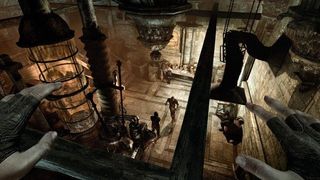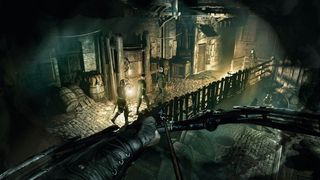Thief preview: Garrett returns to a city of voyeurism and detail, power and character

Instead The City is divided between an autocratic Baron – whose guards Garrett will spend a lot of time piling unconsciously in dark corners – and a growing, seething population on the verge of revolution, with the feudal and industrial charging each other headon. “We skipped the Renaissance,” says Cantin. “We're not making a historical game, we don't have to stick to that period – we wanted to have two brutal periods that clashed.” This brings up an interesting point of philosophical distinction between Thief and Assassin's Creed, a series that many at Eidos Montreal have worked on: Assassin's Creed is rooted in the Renaissance as a defining moment of civilised man's evolution; Thief is about stealing things in the dark.
So it's interesting that the two now share some similarities – with The City bigger and more explorable than before, Thief now includes third-person climbing, scrambling and ledge-inching, with a claw grapple (not entirely unlike Assassin's Creed: Revelations' hook) to make the acrobatics smoother and faster.
"Thief now includes third-person climbing, scrambling and ledge-inching."
Including third-person moments has clearly been a laboured decision (the team ask assembled journalists pointblank if the perspective shift breaks the immersion) but is apparently preferable to the first-person limitations on agility that came in, say, Dishonored.
In the demo, a burst of third-person clambering brings Garrett to the rooftops. It's an impressive view, a Hammer Horror matte painting of atmospheric light and shadow with his clocktower hideout (as The City's only landmark, it's also the worst hideout ever) visible in the distance. Cantin describes it as a “cold, blue, Jack the Ripper mood”, by which he means it's full of moonlight, cobbles and fog. The fog is particularly important, because if it were up to Cantin the game would actually be black – and he's not even joking. “Technically, we want to have a pitch dark game, and to see nothing on screen. The fog helps us to see things in a dark setting, a night setting. It's helping us to create gameplay as well as a visual mood.”
Thief is a game built of contrasts: most obviously between light and shadow, quiet and loud, medieval and Victorian, but also – it's clear once Garrett slips inside his target building in the demo – between frozen exterior blues and warm interior oranges.

Emphasising the 'layering' effect of The City – of the past existing underneath the present – The House of Blossom, an opium-cloud bordello run by the exotic and oddly deep-voiced Madame Xiaou Xiaou, is in fact the same building as the old Keeper Library. The books are gone, replaced with red drapes, rich brown furniture and glowing firelight.
The House of Blossom underlines the common ancestry between Thief and Dishonored – the extravagant masks, the decadent opulence, the busy rota of characterful NPCs. But it also underlines the key difference – that while Corvo was a man of magic, Garrett is still a creature of the dark. The shadows are everything, and while his world has been updated and made more credible, when Garrett stands in them he's completely invisible. He lurks, he distracts and he swipes, gradually exploring the location to build a picture of dangers and dark, safe areas. It's reassuringly familiar.
PC Gamer Newsletter
Sign up to get the best content of the week, and great gaming deals, as picked by the editors.
"Corvo was a man of magic, Garrett is still a creature of the dark"
While inside Madame Xiaou Xiaou's office breaking into her strongbox, that too-deep voice warns that Garrett might be interrupted. This is a chance to show off perhaps the biggest addition to Thief: Focus. Focus is a temporary abilities boost that, for a few seconds, makes Garrett better at everything. He can see things others can't – switches for secret passages, chandeliers that might crush guards – take down several attackers in a few seconds, and swiftly snatch loot. Activating Focus drains a nonrecharging resource with the aim of limiting players to tactical, essential uses, but it's still a move away from the stern old formula of patience and perfection – a get-out-of-jail-for-a-chunk- of-this-blue-bar card.
Super purists may shudder at this. But they do a lot of shuddering. On balance, I've decided Focus is fine (actually, on balance I've decided it's a fine bit of balancing). Thief should be about freedom and choice – as well as bocking people with short, blunt instruments – and the kind of person who complains vigorously about Focus will also have already loaded their last saved game before they have to use it.
The most important objectives in Thief are those you set for yourself – dropping all the guards on a level down the same well, or disavowing stealth and stabbing everyone in the neck – and the most important thing Thief should provide is a world of tools, freedom and surprises. That's why, as the demo ends and Garrett heads for a violent exit, that overheard line becomes my favourite: “I heard it's like stroking a turtle!” Because it's a surprise, and suggests a world of further surprises.
Most Popular


